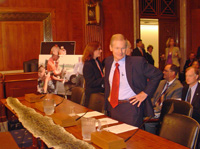USARK and the Reptile Nation will remember 2009 as “The Year of the Python.”
Click image to enlarge Senator Bill Nelson Testifies in reference to the Burmese python. |
The most challenging year in the history of the reptile community was 2009. A combination of federal legislative proposals, poor quality “science,” and unprecedented media sensationalism all swirled around the Burmese python and came together as a perfect storm bearing down on the Reptile Nation. Ambitious politicians, self-serving scientists and irresponsible journalists turned a moderate problem, localized in the southern tip of Florida, into a national python frenzy. The specter of a giant snake in the Everglades poised to expand across the southern third of the United States was a fairytale that played up to sensationalized journalism so well, that the mass media couldn’t stop themselves from perpetuating it. Politicians and scientists offered misinformation and wild rhetoric as if it were truth. An article in the December 2009 issue of Playboy Magazine entitled “The Great South Florida Python Scare” seemed to be the only media story that saw through this epic fairytale. USARK and the Reptile Nation will remember 2009 as “The Year of the Python.”
Even as we enjoy success in the political arena, the focus will now shift to the regulatory side. Last April USARK and the Reptile Nation spearheaded a grass roots effort generating almost 50,000 individual written letters to the House Committee on Natural Resources derailing H.R. 669 the Nonnative Wildlife Invasion Prevention Act. H.R. 2811 and S.373, companion bills in the U.S. House and Senate (aka The Python Ban), have lost momentum. Again USARK and the Reptile Nation led a blockbuster grass roots campaign that more than doubled the number of individuals that participated against H.R. 669. We also enjoyed the support of the U.S. Chamber of Commerce and a panel of 11 highly-respected scientists. We set up high level meetings between congressional members and constituents convincing a bipartisan group of Senators and Congressmen of the merits of our case. The Python Ban is not officially dead, but it has lost its momentum.
The announcement by Interior Secretary Salazar that the USFWS will post a proposed Rule Change to the Injurious Wildlife List in the Federal Register in early February signals the greatest challenge for the Reptile Industry to date. This is not a Notice of Inquiry like that which occurred in 2008. This is the end game of Rule Change. Addressing this threat will be labor intensive, but we have positioned ourselves to succeed. This is exactly what USARK has asked for; to be able to address potential Lacey Act amendments through the established process of Rule Change. We now have the opportunity to build on our political success. Make no mistake, if we don’t pull together as an industry to meet this threat ALL nine species (including Boa constrictor) outlined by the USGS will be listed on the Injurious Wildlife List of the Lacey Act. It is time to put petty bickering aside and work together as never before. USARK will continue to provide the kind of hands-on leadership to the Reptile Nation that our members have come to expect.
Andrew Wyatt is the President of the United States Association of Reptile Keepers (USARK) and has been an avid herp enthusiast for more than 35 years. He has traveled the world and has had his animals featured in a number of television productions. For more information about USARK, click here .



